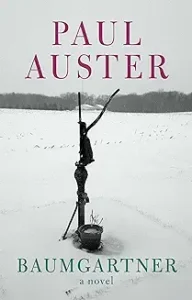Baumgartner by Paul Auster 2023
Auster is one of contemporary America’s best know writers. His 18 novels have received widespread critical recognition, though my favorite Harvard professor/critic James Wood has lambasted Auster’s work. Nonetheless, his novels are best sellers and several have been adapted for movies or TV.
I liked this book very much except for the ending. Baumgartner is a 72 year old Princeton professor of something or other (?philosophy, comp lit) who is still grieving the loss of his wife who drowned in a freak accident ten years earlier. Anna had been a writer as well, though unpublished until Baumgartner gathered 80 or so of her poems into a successful volume. We follow Baumgartner through his random days of distracted errands and chores, writing a new work, revisiting Anna’s manuscripts and unfinished works, and his nostalgic review of his childhood. Nothing much happens but Auster’s skillful use of flashbacks based on B’s and Anna’s journals and publications as well as B’s revisiting his childhood enable us to learn much about each member of this literary couple. As in many of his earlier works, Auster is exploring questions of life’s meaning, our individual loneliness and isolation, the determinism of family and childhood experiences, and the role of coincidence and random events.
I was quite engaged by the book and became increasingly edgy as I reached the last few pages with no sign of a conclusion or tidying up of loose ends, and sure enough, the book ends with this sentence: “And so, with the wind in his face and blood still trickling from the wound in his forehead, our hero goes off in search of help, and when he comes to the first house and knocks on the door, the final chapter in the sage of S.T. Baumgartner begins.” Boo, hiss, cheater! How could Auster leave me hanging like that after I had invested several hours in reading the first 201 pages of his novel? It felt unfair, though I must admit, it was thought-provoking as I tried to noodle out several possible endings to this book. Did S.T. (by the way, the initials stand for Seymour Tecumsah, the latter chosen by his socialist/anarchist tailor father who admired the Native American Chief) die in the auto accident (as happened to a character involved in an auto accident caused by an animal on the road in the recently read ‘North Woods’)? Did he discover a new love-interest or was he murdered by the occupants of this house in the New Jersey Pine Barrens. Oy!
Auster plays with the reader in other ways. S.T’s mother’s maiden name was Auster and we learn of her roots in Eastern Europe. Are those true facts about his own family? Also, his relationship with his late wife, Anna who wrote poetry, essays, short stories, and translated works seems to be an idealized version of Auster’s own first marriage to the widely read and admired Lydia Davis. An earlier work by Davis referred to her ex-husband only as ‘him’ never using his name. Makes me wonder who dumped whom.
Glad I read this and will continue to be both engaged and enraged by Auster leaving me and S.T. hanging at the end.



